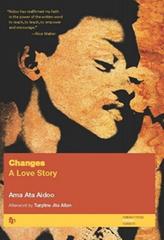 Ama Ata Aidoo, a Ghanaian playwright, author and activist "who was hailed as one of Africa's leading literary lights as well as one of its most influential feminists," died May 31 at age 81, the New York Times reported. In a career that included writing plays, novels, and short stories, stints on multiple university faculties and, briefly, a position as a cabinet minister in Ghana, Aidoo "established herself as a major voice of post-colonial Africa."
Ama Ata Aidoo, a Ghanaian playwright, author and activist "who was hailed as one of Africa's leading literary lights as well as one of its most influential feminists," died May 31 at age 81, the New York Times reported. In a career that included writing plays, novels, and short stories, stints on multiple university faculties and, briefly, a position as a cabinet minister in Ghana, Aidoo "established herself as a major voice of post-colonial Africa."
Her breakthrough play, The Dilemma of a Ghost (1965), "explored the cultural dislocations experienced by a Ghanaian student who returns home after studying abroad and by those of his Black American wife, who must confront the legacies of colonialism and slavery. It was one of several of Ms. Aidoo's works that became staples in West African schools," the Times wrote.
Aidoo's novel Changes: A Love Story won the 1992 Commonwealth Writers' Prize for best book (Africa). Her landmark debut novel, Our Sister Killjoy, or Reflections from a Black-Eyed Squint (1977), "recounted the experiences of Sissie, a young Ghanaian woman who travels to Europe on a scholarship to better herself, as such a move was traditionally described, with a Western education. In Germany and England, she comes face to face with the dominance of white values, including Western notions of success, among fellow African expatriates," the Times noted.
A Fulbright scholar who spent years as an expatriate, Aidoo experienced feelings of cultural dislocation as well. "I have always felt uncomfortable living abroad: racism, the cold, the weather, the food, the people," she said in a 2003 interview published by the University of Alicante in Spain. "I also felt some kind of patriotic sense of guilt. Something like, Oh, my dear! Look at all the problems we have at home. What am I doing here?"
She accepted an appointment as Ghana's minister of education in 1982, with the goal of making education free for all, but resigned after 18 months when she realized the extent of the many barriers she would have to overcome to achieve that goal. After moving to Zimbabwe in 1983, she developed curriculums for the country's Ministry of Education. She founded the Mbaasem Foundation in 2000 to support African women writers.
Aidoo "was a major Pan-Africanist voice, arguing for unity among African countries and for their continued liberation. She spoke with fury about the centuries of exploitation of the continent's natural resources and people," the Times wrote. Changes: A Love Story is available from Feminist Press.

